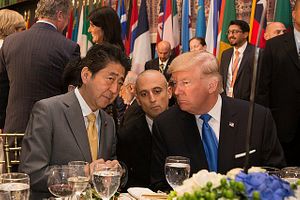Based on the country’s experience after the Second World War, popular opinion in Japan holds that the United States is the preferred superpower. Of course, Japan has agreed to many demands that it might have found to have been unpalatable over the past seventy years, but, even so, when the security guarantees are included, the general consensus has been that the United States is the preferred superpower. Now, though, with the emergence of the Trump administration, that consensus is being shaken.
The Japanese economy developed in tandem with the start of the Cold War and with the support of the United States, but several industries became major exporters to the United States, producing repeated bouts of trade friction. Typically, trade negotiations boiled down to voluntary restrictions on exports as a face-saving measure for the United States – the free market superpower – as it sought to protect its domestic industries. However, negotiations between Japan and the United States gradually came to include matters that went beyond specific industries. Emphasizing the distinctiveness of the Japanese economy, the so-called revisionists advocated reforms to the Japanese model and changes in the U.S. trade policy approach to Japan. Inhabiting the fringes of academic circles, these revisionists sought to peddle their own personal opinions, such as deregulating large-scale retailers to promote imports, or eliminating transactions between affiliated enterprises within the keiretsu corporate groups to promote imports of parts. They referred to the strong dollar, a result of the U.S. budget deficit, as a “misalignment,” and demanded large-scale currency manipulation through coordinated intervention. This became the Plaza Accord. Under the pretext of throwing open the “closed” Japanese market, nonmarket quantitative targets were introduced to set aside a fixed share of the market for semiconductors manufactured overseas.
When the Clinton administration took office, the Cold War had ended and the priority issue was to counter Japan, seen as an economic rival. During the financial crisis Japan experienced around that time, Washington attempted to obstruct controls on the short-selling of shares in financial institutions. (The U.S. government had no hesitation in regulating short-selling at the time of the collapse of Lehman Brothers.) The Clinton administration backed WTO membership for China. In contrast to the obsession with the yen-dollar exchange rate, no conditions were imposed on the renminbi exchange rate. As a result, Japanese corporations flooded to China to set up bases for exports to the United States. It was obvious that the Chinese economy was extremely heterogeneous and that there was a tendency to ignore intellectual property, but political economists patted themselves on the back, claiming that many people were being lifted out of poverty.
The Clinton administration also pushed for financial deregulation and the relative importance of the financial industries rose rapidly. Since seed money capital needed to flow into the United States in order for U.S. financial institutions in countries with a current balance deficit to invest overseas, they stopped paying lip service to intervention in the yen-dollar rate. This was the “strong dollar” policy. The traditional protection of manufacturing industries and domestic production was no longer a priority and U.S. corporations turned to NAFTA and other agreements for their supply chains.
This may seem fairly highhanded behavior, but as the preferred superpower the United States was able to get away with it. Basically, the United States threw open its market to Japanese products. Although the influence of the revisionists was strong, it did not last long. In his book The Moral Consequences of Economic Growth, Professor Benjamin M. Friedman at Harvard University has shown that even though undemocratic trends in U.S. society grow stronger during periods of economic stagnation, democracy revives in periods of continuous growth. On the emergence of China, based on Friedman’s logic, we hope to see the rise of leaders who will reshape the international order with Japan and Europe as allies, and without the blind acceptance of Clinton or the threats of Trump.
Unlike Japan, China does not depend on the United States for its security guarantees. Consequently, China is hardly likely to be in a position where it would be prepared to listen to unreasonable demands from the United States. The policy responses of the Xi Jinping administration illustrate this point well. Unlike Japan, China has the potential to replace the United States as a superpower. The United States may have to go to considerable lengths to protect its position. This would appear to be the policy of the Trump administration, but the two powers are on a collision course.
By successfully combining a non-democratic political system with a government-led market economy, China is challenging the political and economic models of Western countries. Just as with the third-party payment methods developed in China, many developing countries find this model attractive. With the BRICS, the Asian Infrastructure Investment Bank, One Belt One Road, and other initiatives, China has also begun to challenge the international order centered on the West. Despite the elimination of opposition within the country, there are also glimpses of attempts to create a “correct nation” by cracking down on corruption. Still, these are early days, and China is a long way from being the preferred superpower, let alone a correct nation, and other countries are not yet choosing to follow it. Avoiding the current collision and continuing its efforts to become a correct nation, China may hand over to its next generation a new preferred superpower. It is a matter of waiting, as Confucius explains in The Analects when he says “… at seventy I could follow my heart’s desire without overstepping the boundaries of what was right.”
The United States was historically the preferred superpower that just about managed not to overstep the boundaries of what was right, even when its requests were unreasonable. But that was before the Trump administration.
Jinushi Toshiki is a professor at Kobe University.

































